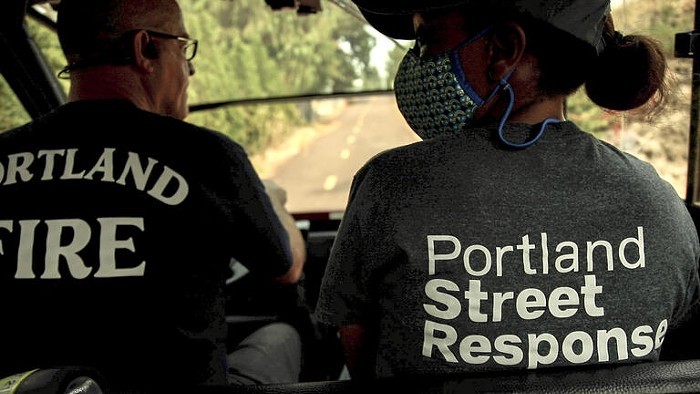Eight days before Portland’s most severe snowstorm in 80 years, Portland Commissioner Rene Gonzalez banned Portland Street Response (PSR) outreach workers from distributing tents and tarps to people living outside. In the wake of the ban, multiple PSR workers—who spoke to the Mercury on the condition of anonymity due to fear of retaliation—say the ban has threatened the safety of unhoused Portlanders, further limited PSR’s agency, and disempowered outreach workers.
“It’s really hard saying ‘I’m sorry, we can’t give tents out anymore,’” a PSR employee said. “The looks on people’s faces—there’s fear, there’s sadness, there’s confusion.”
On February 14, Gonzalez announced a “temporary suspension” of tent and tarp distribution from the city of Portland’s public safety bureaus, including PSR, a program housed within Portland Fire and Rescue that provides non-police emergency response to 911 calls related to mental health crises or regarding unhoused people. Gonzalez, the commissioner in charge of PSR, says the ban aims to reduce the number of fires at homeless camps. According to Portland Fire Marshal Kari Schimel, Portland Fire has responded to 1,015 tent and tarp-related fires over the past two years. By taking away flammable materials like tents and tarps, Gonzalez argues he’s saving homeless Portlanders from being burned in a tent fire.
“Unsanctioned fires put our first responders, houseless individuals, and our neighborhoods at risk,” Gonzalez said in a press release. “I am taking immediate action to save lives and protect Portlanders from life-shattering injuries.”
The majority of the tents and tarps distributed to homeless Portlanders, however, are supplied by the Joint Office of Homeless Services, not PSR. Over a six-month period in 2022, PSR distributed 473 tents to people living outside, compared to the 22,000 tents and 69,000 tarps the Joint Office purchased and distributed during the first two years of the COVID-19 pandemic when many indoor shelters were closed or severely limited. In an interview with Willamette Week, Gonzalez acknowledged that banning PSR from distributing tents and tarps may have a “marginal” impact on the frequency of fires at homeless camps.
Earlier this month, unionized PSR employees represented by PROTEC17—a union representing more than 9,000 workers in Oregon and Washington—condemned the ban, calling it inhumane and dangerous. PROTEC17 represents the majority of PSR employees including mental health crisis responders, peer support specialists, and community health workers.
“What Commissioner Gonzalez claims as a temporary ban cruelly went into effect during one of the coldest and snowiest winters on record, with no input from us—the people who do this work,” the statement reads. “This policy has put our clients at risk, increased the stress on our workload, and does nothing to solve Gonzalez’s proclaimed issue of fires at campsites, which he openly admitted."
Gonzalez’s spokesperson Ben DuPree declined to comment on the PSR workers’ statement, but noted that PSR Program Manager Robyn Burek was included in conversations about the ban before it went into effect. Burek told the Mercury she provided Gonzalez’s office information about the role tents and tarps play in PSR’s work, but did not help craft the policy nor did she review the ban before it was publicly announced.
Multiple PSR employees told the Mercury the ban has further limited options for unhoused residents who already struggle to access resources in Portland’s overburdened homelessness services system.
“There are consistently not enough beds for people to stay in,” a PSR employee said. “There are consistently folks who have disabilities and can’t go to those places. When there are one or two [beds available], people don't always meet the [shelter] requirements. So, when there are literally no other options, tents give dignity, they save lives, they give privacy, and it’s humanizing.”
In addition to limiting an option for people living outside, the restriction on tents and tarps also piles on to the existing limitations placed on the program. PSR staff cannot be dispatched to calls where a person is reported to be carrying a weapon, is acting "violent toward others," is obstructing traffic, is reportedly suicidal, or is located inside a private residence. Multiple reports on PSR’s progress conducted by Portland State University researchers have identified the restrictions as a hindrance, with several police officers telling researchers that PSR’s skills could be particularly helpful in those situations. However, the restrictions can only be changed through contract negotiations with the Portland Police Association—the union representing rank-and-file police officers—which have dragged on for months.
“Sometimes it feels like we have so few options,” a PSR employee told the Mercury, “and when an additional one is removed, it increases the challenges of the job.”
PSR’s PROTEC17 union representative Rachel Whiteside believes the ban comes at a time when Portlanders are growing fatigued with visible homelessness and a perceived lack of action from city leaders—the same sentiment that underscored Gonzalez’s successful campaign for City Council.
“There's a lot of compassion fatigue around a lot of issues, and people who are in no way able to defend themselves are the easiest targets and victims of that compassion fatigue,” Whiteside said. “I think [the ban] is reflective of that. When you have a community that is more affluent, it's very easy for them to target those folks and it's very easy for politicians to go where the money is.”
DuPree, Gonzalez’s spokesperson, said the Commissioner has no plans to lift the ban, despite the negative feedback.
“This was a moratorium,” DuPree said, “and while the Commissioner reserves the right to reevaluate, we’re not going to be making any changes at this time.”




















